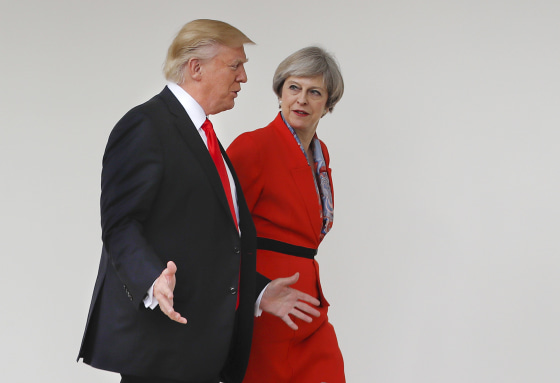President Trump’s admirers often like to compare him to former President Ronald Reagan, another political outsider who took Washington by storm. Laura Ingraham’s book, “Billionaire at the Barricades: The Populist Revolution from Reagan to Trump” lays out the case in great detail; the theory has even been embraced by conservative stalwarts like Pat Buchanan.
But there are also plenty of ways in which that argument falls apart: Consider, for example, that in a mere 30 years, the American president has gone from excoriating the scourge of communism alongside British Prime Minister Margaret Thatcher and exhorting Soviet General Secretary Mikhail Gorbachev to “tear down this wall” to lobbing insults at Prime Minister Theresa May via Twitter and befriending Russian President Vladimir Putin even as the latter continues to consolidate power at the expense of the liberty of millions of Russians.
Reagan and Thatcher were ideological comrades-in-arms, and their support for each other’s ideas and reforms helped to strengthen the conservative movements in their respective countries. Both were committed to free markets, individual liberty and personal dignity — and their interest in classical liberalism and fondness for economic tomes by Friedrich Hayek and John Stuart Mill set them apart from their contemporaries. Sharing a worldview that enabled them to bounce ideas off each other, theirs was an alliance forged on mutual respect and admiration. Even when they disagreed — for example, with regards to the Falklands — it was done with discretion.
Contrast that with Trump’s high-profile rebuke of the conservative May, who merely attempted to set the record straight on an extremist group operating in her own country. Earlier this year, May had gambled on Trump despite his unpopularity among her countrymen, no doubt hoping that a close relationship would solidify the chances for a US-UK trade deal after the completion of their withdrawal from the European Union. Yet, despite initially positive signs for the deal, her calculation that a positive relationship with Trump would bear dividends at home seems to have been misplaced, as Trump’s ongoing (and unwelcome) commentary on terrorism in Britain has created tremendous pressure for May to rescind her state visit invitation.
Unfortunately, the Prime Minister is now in a no-win situation; pushing back against Trump’s disrespect is certain to invite further attacks (as Trump's long list of rhetorical adversaries have already discovered), whereas taking the high road and ignoring his childish insults makes her look weak. And her conundrum is further complicated by the fact that, even prior to this incident, May’s support among her own party had weakened significantly in recent months.
This situation is not good for the United Kingdom, and it isn't good for the United States.
The transatlantic relationship has been a cornerstone of American foreign policy for two hundred years. Dubbed the “Special Relationship” by Winston Churchill in 1945, the ties between our countries are more than simply filial; they’re economic and cultural, as well as defense and intelligence-focused.
Obviously, it hasn’t always been a perfect partnership: Our relationship have waxed and waned based on the personality quirks of the two countries’ leaders, as well as geopolitical events such as the Vietnam War and Iraq. But it’s one thing to not see eye-to-eye on a few policy issues, and another to consciously pivot away from the alliance. Put bluntly, to poison the special relationship is to undermine America's interests.
British Secretary of State for Education Justine Greening told the BBC on Thursday that “in the end, our relationship with the United States has a longevity to it that will succeed long after presidents come and go” — an accurate statement, albeit not a deeply reassuring one given that the current president will likely remain in power for the next three years.
It’s also worth considering the lessons that other foreign leaders might draw from this incident: After all, an ostensible friend, long-time ally and ideological comrade-in-arms stuck her neck out and was met with a very public broadside from the sitting U.S. president over a series of tweets supportive of a domestic extremist group with which she's forced to contend. It seems unlikely that many other heads of state will be lining up to do America any favors any time soon, for fear of provoking an ill-conceived response that may harm them domestically.
Statesmen like Ronald Reagan didn’t go out of their way to antagonize their enemies: They drew up plans behind closed doors to defeat them diplomatically, militarily and ideologically. And they certainly didn’t use the bully pulpit to humiliate their friends.
With all due respect — when it comes to managing foreign affairs, at the very least — this president is no Ronald Reagan. And America’s allies deserve better.
Nicole Neily is a senior fellow at the Independent Women’s Forum and the former president of the Franklin Center for Government & Public Integrity.

